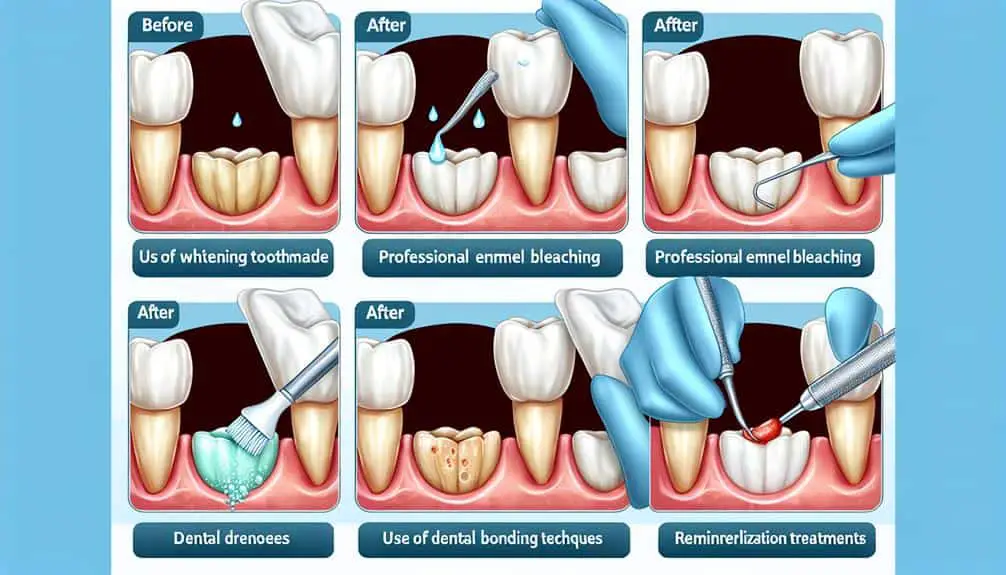Looking to brighten your smile at home safely? Try these enamel-safe DIY teeth whitening solutions. Mix baking soda and hydrogen peroxide for a powerful whitening treatment – remember, don't overuse to avoid enamel erosion. Coconut oil pulling with its antimicrobial properties may improve oral health and give you fresher breath. Activated charcoal paste effectively removes surface stains, but use with caution to prevent enamel damage – consulting your dentist before use is advisable. Embrace these gentle methods for a brighter, healthier smile!
Key Points
- Use a mixture of baking soda and hydrogen peroxide for effective whitening.
- Incorporate coconut oil pulling to enhance oral health and potentially whiten teeth.
- Apply activated charcoal paste sparingly to remove surface stains without harming enamel.
- Prioritize enamel safety by consulting a dentist before trying DIY whitening methods.
- Embrace gentle and natural solutions to safeguard enamel and promote a brighter smile.
Baking Soda and Hydrogen Peroxide
Using a mixture of baking soda and hydrogen peroxide can be an effective DIY solution for teeth whitening. Baking soda is mildly abrasive and can help remove surface stains on teeth, while hydrogen peroxide is a bleaching agent that can lighten the color of your teeth. When combined, these two ingredients create a powerful whitening treatment. However, it's important to be cautious when using this method.
To minimize the risk of enamel erosion, it's advisable to limit the frequency of this treatment. Excessive use of baking soda can wear down the enamel, leading to increased sensitivity and other dental issues. Additionally, rinsing your mouth with a solution of lemon juice after the treatment may further contribute to enamel erosion due to its acidic nature.
Moreover, some individuals may experience tooth sensitivity when using this whitening method. If you notice any discomfort or pain, discontinue use immediately. Prolonged usage of baking soda and hydrogen peroxide for teeth whitening may exacerbate tooth sensitivity and damage the enamel. It's important to use this DIY solution judiciously to avoid potential harm to your teeth.
Coconut Oil Pulling
For an ancient oral health practice that may offer potential teeth whitening benefits, consider incorporating coconut oil pulling into your dental routine. Coconut oil pulling is a natural remedy that has gained popularity for its oral hygiene benefits. This practice involves swishing coconut oil around in your mouth for about 15-20 minutes, allowing the oil to pull out bacteria and debris. The lauric acid present in coconut oil has antimicrobial properties that can help improve oral health by reducing harmful bacteria in the mouth.
Research suggests that coconut oil pulling may contribute to fresher breath, reduced plaque buildup, and healthier gums. While scientific evidence on its teeth whitening effects is limited, some individuals report brighter teeth after consistent use. It's crucial to emphasize that coconut oil pulling shouldn't replace regular brushing and flossing but can be a beneficial addition to your oral hygiene routine. Incorporating this natural remedy into your dental care regimen may offer additional benefits beyond just teeth whitening.
Activated Charcoal Paste
Consider incorporating activated charcoal paste as a potential teeth whitening solution, known for its ability to effectively remove surface stains and brighten your smile. When used correctly, charcoal toothpaste offers benefits such as stain removal through adsorption, not absorption, which binds to the surface of the teeth to lift away stains. However, it's important to be aware of the risks associated with using charcoal toothpaste, such as its abrasive nature that can potentially damage enamel and lead to tooth sensitivity if used excessively or too aggressively.
For a DIY charcoal teeth whitening process, mix activated charcoal powder with a small amount of water to form a paste. Gently brush this paste onto your teeth, ensuring even coverage, and let it sit for a couple of minutes before rinsing thoroughly. Remember to limit the use of charcoal paste to once or twice a week to avoid unwanted side effects. Always consult with your dentist before incorporating charcoal paste into your oral care routine to confirm it aligns with your dental health needs.
Frequently Asked Questions
Can DIY Teeth Whitening Solutions Cause Tooth Sensitivity or Damage to Enamel in the Long Run?
Using DIY teeth whitening solutions can potentially lead to tooth sensitivity and enamel damage in the long run. It's important to be cautious and consult with a dental professional to guarantee the safety of your teeth.
How Often Should I Use These DIY Teeth Whitening Solutions for Best Results?
For best results, use DIY teeth whitening solutions 2-3 times per week. Consistency is key for long term success. Overuse can lead to enamel damage and sensitivity. Remember, moderation is essential for maintaining a healthy smile.
Are There Any Potential Side Effects or Risks Associated With Using These Natural Teeth Whitening Methods?
When considering natural teeth whitening methods, be aware of potential risks like tooth sensitivity. It's important to monitor your oral health and consult a dentist if you experience any adverse effects. Prioritize safety.
Can DIY Teeth Whitening Solutions Effectively Remove Stubborn Stains or Discoloration Caused by Factors Like Smoking or Coffee Consumption?
To effectively remove stubborn stains or discoloration caused by factors like smoking or coffee consumption, DIY teeth whitening solutions can be used. Safety is key, so make sure you're using enamel-safe methods. Consider frequency for long-term results.
Are There Any Specific Precautions or Guidelines I Should Follow When Using These Natural Teeth Whitening Methods at Home?
When whitening your teeth at home, it's important to follow precautionary measures for safety. Proper application techniques guarantee effective results. Always consult with dental professionals for guidance to maintain enamel health and achieve desired outcomes.



